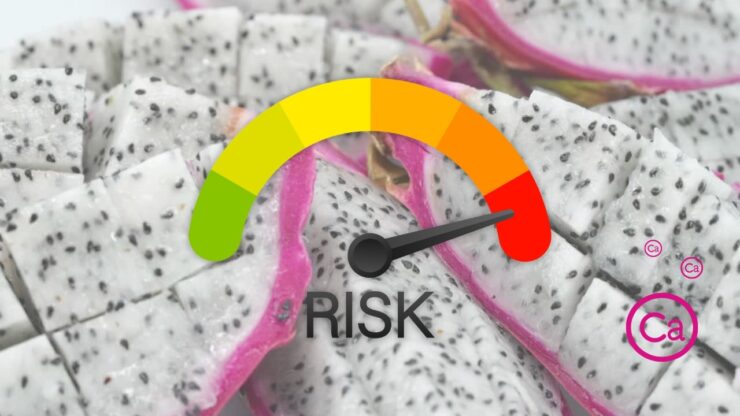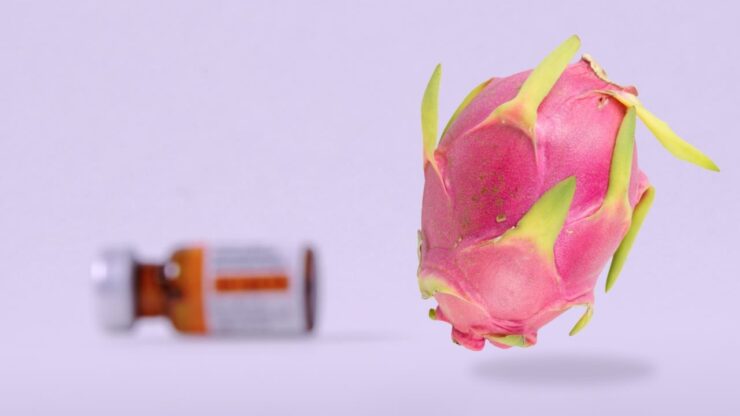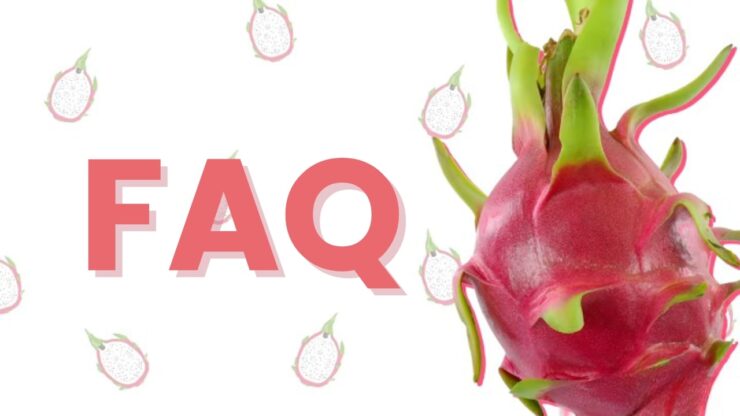Dragon fruit, also known as pitahaya, is a tropical fruit that has gained popularity in recent years for its unique appearance and sweet taste. While this fruit has many health benefits, eating too much of it can lead to some unwanted side effects.
In this article, we will explore the potential downsides of consuming excessive amounts of dragon fruit, including digestive issues, nutrient imbalances, and allergic reactions. It’s important to remember that moderation is key when it comes to any food, including this exotic fruit, to ensure that you are able to enjoy its benefits without putting your health at risk.
Digestive Issues from Overconsumption

They contain a considerable amount of dietary fiber and sugar, which can lead to digestive issues if consumed excessively. Eating too much of this exotic fruit can lead to bloating, gas, and indigestion, among other digestive problems.
Let’s delve deeper into the effects of eating too many dragon fruits on the digestive system.
Diarrhea
Eating too many dragon fruits can cause digestive issues such as diarrhea due to their high fiber content. While fiber is essential for digestion, consuming too much of it can have negative effects on the digestive system, especially for those with sensitive stomachs.
To avoid digestive issues, it is recommended to eat dragon fruits in moderation and gradually increase the intake of fiber-rich foods, allowing your body to adjust.
If diarrhea persists, it is important to drink plenty of water and electrolytes to avoid dehydration. Additionally, over-the-counter medications such as loperamide can be used to alleviate symptoms.
For those who are prone to digestive issues, it is best to consult a doctor or a dietitian for a personalized diet plan.
Abdominal cramps and bloating
Abdominal cramps and bloating are common digestive issues that can be caused by the overconsumption of dragon fruits.
They are packed with fiber, which is great for digestion, but overeating them can lead to discomfort and other digestive issues. Some potential side effects of eating too many dragon fruits include:
- Abdominal cramps
- Bloating and flatulence
- Diarrhea
To avoid these side effects, it’s best to eat them in moderation, especially if you’re not used to consuming high-fiber foods. Start by eating a small amount and gradually increase your intake over time. Additionally, make sure to drink plenty of water to help your body digest the fiber properly.
Pro tip: If you experience discomfort after eating dragon fruits or any other high-fiber foods, try peppermint tea, which can help alleviate abdominal pain and bloating.
Nausea and vomiting
While they are packed with nutrients, consuming too many of them can lead to digestive issues such as nausea and vomiting. These symptoms occur due to the high fiber content in dragon fruits, which can be difficult to digest in large quantities.
If you’re experiencing nausea and vomiting after consuming dragon fruits, it’s best to drink plenty of water to stay hydrated and let the symptoms pass on their own. If the symptoms persist or are severe, seek medical attention immediately.
To avoid digestive issues from overconsumption, limit your intake of dragon fruits to 1-2 servings per day and ensure that you’re drinking enough water to aid digestion.
Allergic Reactions from Excessive Intake

Eating too many dragon fruits can have serious side effects including allergic reactions. They contain compounds known as oxalates which can trigger an allergic reaction in those with certain health conditions.
In this section, we will discuss the potential allergic reactions that may occur from eating too many of them.
Itchiness and rashes
The potential allergens in dragon fruit are proteins, which can irritate the skin and cause symptoms such as itchiness, redness, and swelling. Some people may also experience vomiting, diarrhea, or difficulty breathing, which can be life-threatening in severe cases.
To prevent allergic reactions from excess intake of dragon fruit, it is recommended to consume it in moderation and gradually increase the amount over time. Be sure to check for any signs of allergic reaction before consuming large quantities. If you experience any symptoms, seek medical attention immediately.
Pro tip: It’s always wise to consult with your healthcare provider before incorporating new foods into your diet, especially if you have a history of allergies or food sensitivities.
Swelling of the lips and tongue
Excessive intake of them can cause swelling of the lips and tongue, among other allergic reactions. While rare, this fruit can cause an allergic reaction in some people due to the presence of allergens in the fruit.
Symptoms may include itching, hives, abdominal pain, and difficulty breathing. If you experience any allergic reaction after eating dragon fruit, seek medical attention immediately.
Difficulty breathing in severe cases
Difficulty breathing is one of the severe side effects that can result from excessive consumption of dragon fruit due to allergic reactions. It is a healthy fruit known for its high fiber and nutrient content. However, consuming too much of it can lead to various side effects.
Calcium Absorption Interference

They are packed with nutrients, vitamins, and minerals like calcium, magnesium, and phosphorus, which can be beneficial for health. However, there is a potential downside to consuming too many of these fruits. Eating too many dragon fruits can interfere with your body’s ability to absorb calcium, which can potentially lead to serious health consequences.
Let’s dive deeper into this issue.
Oxalate content in dragon fruits
It is a delicious and nutritious fruit that is high in vitamin C, fiber, and antioxidants. However, it is also high in oxalates, which can interfere with calcium absorption in the body when consumed in excess.
Oxalates are compounds found in many plants that can bind with calcium in the body, making it difficult for the body to absorb this essential mineral. Over time, this can lead to calcium deficiencies and related health problems, such as osteoporosis and kidney stones.
While dragon fruit is a healthy addition to your diet in moderation, consuming too many dragon fruits regularly can increase your oxalate intake and interfere with calcium absorption.
Pro tip – To minimize the risk of calcium absorption interference, it’s best to consume dragon fruit in moderation and pair it with other calcium-rich foods, such as dairy products or leafy greens.
Risk of kidney stone formation
While dragon fruit is healthy and nutritious, eating too much of it can lead to calcium absorption interference and an increased risk of kidney stone formation.
Dragon fruit is high in oxalates, which bind to calcium in the body and prevent it from being absorbed properly. This can build up in the kidneys over time and lead to the formation of calcium oxalate kidney stones.
To avoid this potential health issue, it’s best to consume dragon fruit in moderation and ensure that you’re getting enough calcium from other dietary sources. Drinking plenty of water also helps to flush the kidneys and reduce the risk of stone formation.
If you’re prone to kidney stones, it’s important to speak to your doctor or a registered dietitian to determine the best dietary approach to minimize your risk.
Effects on Blood Sugar Levels

Eating dragon fruit can positively impact blood sugar levels, as it is naturally low in sugar and contains a good amount of dietary fiber which helps slow the release of glucose into the bloodstream. However, consuming too much can have the opposite effect and cause spikes in blood sugar levels.
Let’s explore the implications of this in more detail.
High sugar levels in dragon fruits
Although they are a healthy and nutrient-rich superfood, they are high in natural sugars that can affect your blood sugar levels if consumed in excess. The side effects of eating too many can include:
- Increased blood sugar levels: The high sugar content in them can raise blood sugar levels, especially for people with diabetes.
- Gastrointestinal problems: Eating too many dragon fruits can lead to bloating, diarrhea, and stomach pain due to the high fiber content.
- Weight gain: The high sugar content can lead to weight gain if consumed in excess.
To prevent these side effects, it is recommended to consume dragon fruits in moderation and as part of a balanced diet.
Risk for developing hyperglycemia and diabetes
Eating too many of them can lead to a high intake of fructose, which may increase the risk of developing hyperglycemia and diabetes in susceptible individuals. While it is low in calories and high in nutrients, it should be consumed in moderation to prevent any negative effects on blood sugar levels.
Some tips for moderating your intake:
- Stick to a serving size of 1/2 a fruit or less per day.
- Pair it with protein and healthy fats to slow down the absorption of fructose in the bloodstream.
- Monitor your blood sugar levels regularly, especially if you have any underlying health conditions.
Effects on Blood Pressure

They are packed with nutrition and are healthy for the body. However, eating too much of them can also have serious consequences. One of the most concerning side effects of dragon fruits is the effect they have on blood pressure. Eating too many dragon fruits can cause an increase in blood pressure, leading to high-pressure-related symptoms.
Let’s get into the details of how dragon fruits can affect blood pressure.
High potassium levels in dragon fruits
The recommended daily intake of potassium is 2,000 to 3,000 mg per day. Consuming more than 4 medium-sized dragon fruits can put you at risk of hyperkalemia, a condition where your potassium levels are too high. This can lead to muscle weakness, irregular heartbeat, and in severe cases, cardiac arrest.
If you have kidney disease or are taking medication that affects potassium levels, it is best to consult your doctor before adding them to your diet.
Pro tip: Moderation is essential when consuming foods high in potassium, including dragon fruits. Consult a doctor or a dietary nutritionist before making any significant changes to your diet.
Risk of increased blood pressure and cardiovascular disease
Eating too many dragon fruits may lead to an increased risk of high blood pressure and cardiovascular disease due to their high potassium levels.
While potassium is essential for maintaining a healthy blood pressure level and preventing heart disease, consuming too much of it can be harmful, especially for those with kidney problems or who are taking medication for high blood pressure.
Therefore, it is important to consume them in moderation and avoid overindulging. As with any food, balance is key.
Incorporating dragon fruits into a well-balanced diet can provide numerous health benefits, but it is important to be mindful of portion sizes and frequency of consumption to avoid any potential negative side effects.
Interaction with Certain Medications

Interactions between drugs and foods can be complex, and it’s important to be aware of the potential risks and benefits.
This section will discuss the potential drug interactions which may occur when eating too many dragon fruits.
Blood pressure medication
While blood pressure medication is essential for maintaining healthy blood pressure levels, certain medications can interact with them and cause adverse side effects. It is essential to consult with a healthcare professional before taking any medication alongside blood pressure medication.
Here are some medications that may interact with blood pressure medication:
- Nonsteroidal anti-inflammatory drugs (NSAIDs)
- Antidepressants
- Diabetic medications
- Cholesterol-lowering medications
If you are taking blood pressure medication, it is important to consult with a healthcare professional before adding dragon fruit to your diet to avoid any potential interactions or complications.
Statins for cholesterol management
Statins are commonly used to manage cholesterol levels in people. However, certain medications can interact with statins and increase the risk of side effects. These medications include antibiotics, antifungal drugs, heart medications, and immunosuppressants. It is essential to discuss all medications you are currently taking with your doctor before starting statin therapy.
They also contain fructose, a type of sugar that, when consumed in large amounts, may cause bloating, gas, or nausea. Hence, moderation is advised, and it’s better to consult a doctor before making any major dietary changes.
Immunosuppressants for organ transplant recipients
Immunosuppressants are vital drugs prescribed to organ transplant recipients to prevent their immune systems from attacking and rejecting the new organ. However, it is essential to understand that these drugs can interact with other medications and trigger adverse reactions.
Some of the medications that may interact with immunosuppressants include antifungal drugs, antibiotics, and anti-epileptics. Therefore, it’s essential to disclose all medications being taken to your doctor before taking immunosuppressants.
Additionally, while eating dragon fruits is considered healthy due to their high fiber, vitamin, and antioxidant content, consuming too many of them can produce high levels of lycopene, which can cause discoloration of the skin or yellowing of the urine. Therefore, it’s advisable to maintain moderation while consuming dragon fruit if you’re on immunosuppressants.
FAQs

Can dragon fruit cause nutrient imbalances?
Eating too much of any fruit can lead to an imbalance of nutrients in the body. Its high fiber content of it can also interfere with the absorption of other important nutrients.
What is the recommended serving size for dragon fruit?
A serving size is typically 1/2 to 1 cup or about 100-200g. It’s best to start with a smaller serving and increase gradually to monitor your body’s reaction.
Can dragon fruit cause skin problems?
There is no evidence that it causes skin problems. However, if you experience any rashes or skin irritation after eating it, it’s best to speak with your doctor.
Can dragon fruit be consumed during pregnancy?
It is considered safe for consumption during pregnancy in moderate amounts. However, it’s always best to speak with your doctor before making any major changes to your diet during pregnancy.
Can dragon fruit be consumed by people with fructose intolerance?
People with fructose intolerance should avoid it as it contains fructose, a type of sugar that is not well tolerated by those with this condition.
Can dragon fruit be consumed by people with histamine intolerance?
It is considered safe for people with histamine intolerance, but it’s best to speak with your doctor before consuming it. Some people with histamine intolerance may still experience symptoms after eating it, so it’s important to monitor your reaction to this fruit if you have histamine intolerance.
Conclusion
In conclusion, eating too many dragon fruits can have some side effects due to their high fiber and nutrient levels. Excessive intake may lead to stomach discomfort, diarrhea, and bloating. However, when eaten in moderation, dragon fruits offer many health benefits, including improved digestion, boosted immunity, and reduced risk of chronic illnesses.
It is important to note that people who are allergic to kiwi, pineapple, or other tropical fruits may also be allergic to them because of their protein structures. Therefore, it’s always important to consume this fruit in moderation, especially if you have a sensitive digestive system or a known allergy.

